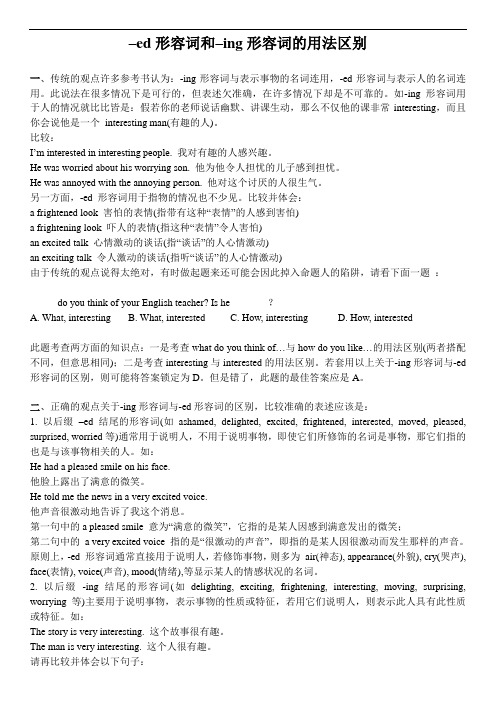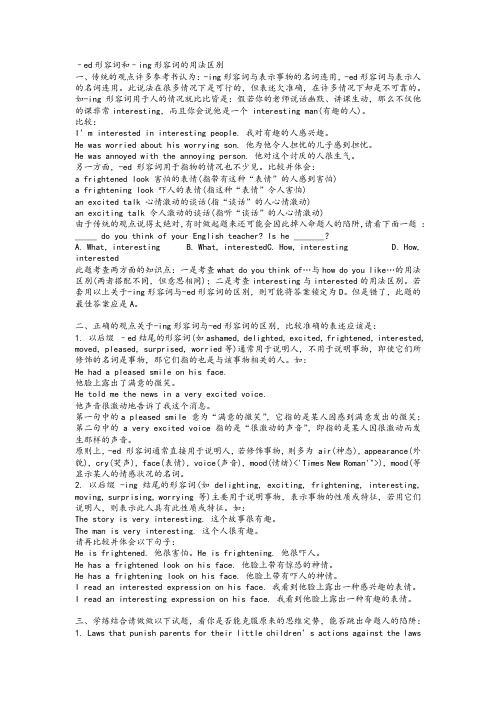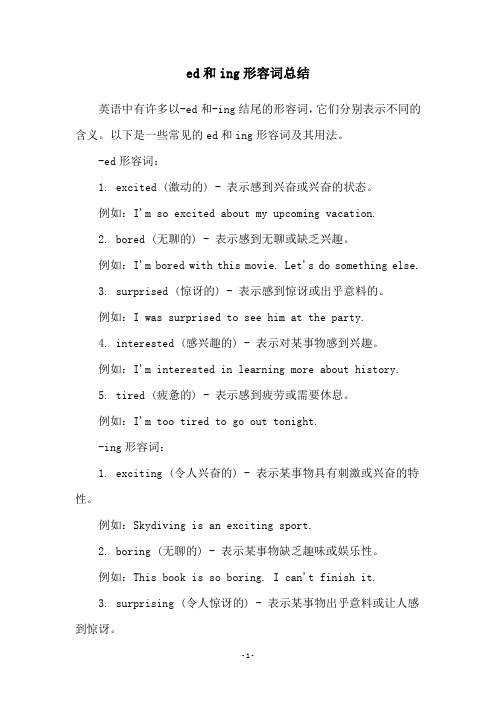初中英语常用-ed-ing形容词
-ed 和-ing结尾的形容词

-ed 和-ing结尾的形容词amazing令人惊异的;amazed 感到惊异的amusing 有趣的,好笑的;amused 觉得好笑的boring令人讨厌的;bored感到厌烦的confusing令人困惑的;confused 感到困惑的disappointing令人失望的;disappointed 感到失望的disturbing令人不安的;disturbed 心神不安的encouraging令人鼓舞的;encouraged 受到鼓励的entertaining愉快的,有趣的;entertained 感到愉快的freezing 冰冻的,严寒的;frozen 冻僵了的frightening 令人害怕的;frightened 感到害怕的inspiring 令人鼓舞的;inspired受到鼓舞的interesting 令人感兴趣的;interested感兴趣的moving 感动人的;moved 受感动的pleasing 令人高兴的;pleased 感到高兴的puzzling 令人不解的;puzzled 感到不解的surprising 令人惊讶的;surprised 感到惊讶的touching 令人感动的;touched 受感动的worrying令人担忧的;worried 感到担忧的tiring令人疲劳的tired劳累的embarrassing 令人尴尬的embarrassed 感到尴尬的exhausting令人精疲力竭的exhausted精疲力竭的convincing 令人信服的convinced相信的fascinating 迷人的,有吸引力的fascinated 着迷的annoying令人生气的annoyed生气的relaxing令人轻松的relaxed 轻松的,放松的练习1.Yesterday our head teacher made such an ______ speech that we all felt _____.excited, exciting2.Jack knows ____ little English that he has never found an ____ job.such, so, excited, exciting3.From the ____ look on his face, I could tell that he failed in the exam.disappointed disappointing4.Those relatives were ____ people. After a few days, I was getting _____ and homesick.boring, bored,5.Find the ____ look on the students’ faces, the professor felt ____ about his explanation. Confusing, confused , embarrassing, embarrassed。
ed形容词和ing形容词

–ed形容词和–ing形容词的用法区别一、传统的观点许多参考书认为:-ing形容词与表示事物的名词连用,-ed形容词与表示人的名词连用。
此说法在很多情况下是可行的,但表述欠准确,在许多情况下却是不可靠的。
如-ing 形容词用于人的情况就比比皆是:假若你的老师说话幽默、讲课生动,那么不仅他的课非常interesting,而且你会说他是一个interesting man(有趣的人)。
比较:I’m interested in interesting people. 我对有趣的人感兴趣。
He was worried about his worrying son. 他为他令人担忧的儿子感到担忧。
He was annoyed with the annoying person. 他对这个讨厌的人很生气。
另一方面,-ed 形容词用于指物的情况也不少见。
比较并体会:a frightened look 害怕的表情(指带有这种“表情”的人感到害怕)a frightening look 吓人的表情(指这种“表情”令人害怕)an excited talk 心情激动的谈话(指“谈话”的人心情激动)an exciting talk 令人激动的谈话(指听“谈话”的人心情激动)由于传统的观点说得太绝对,有时做起题来还可能会因此掉入命题人的陷阱,请看下面一题:_____ do you think of your English teacher? Is he _______?A. What, interestingB. What, interestedC. How, interestingD. How, interested此题考查两方面的知识点:一是考查what do you think of…与how do you like…的用法区别(两者搭配不同,但意思相同);二是考查interesting与interested的用法区别。
ed形容词和ing形容词

–e d形容词和–i n g形容词的用法区别一、传统的观点许多参考书认为:-ing形容词与表示事物的名词连用,-ed形容词与表示人的名词连用。
此说法在很多情况下是可行的,但表述欠准确,在许多情况下却是不可靠的。
如-ing 形容词用于人的情况就比比皆是:假若你的老师说话幽默、讲课生动,那么不仅他的课非常interesting,而且你会说他是一个 interesting man(有趣的人)。
比较:I’m interested in interesting people. 我对有趣的人感兴趣。
He was worried about his worrying son. 他为他令人担忧的儿子感到担忧。
He was annoyed with the annoying person. 他对这个讨厌的人很生气。
另一方面,-ed 形容词用于指物的情况也不少见。
比较并体会: a frightened look 害怕的表情(指带有这种“表情”的人感到害怕) a frightening look 吓人的表情(指这种“表情”令人害怕) an excited talk 心情激动的谈话(指“谈话”的人心情激动) an exciting talk 令人激动的谈话(指听“谈话”的人心情激动)由于传统的观点说得太绝对,有时做起题来还可能会因此掉入命题人的陷阱,请看下面一题:_____ do you think of your English teacher Is he _______A. What, interestingB. What, interestedC. How, interestingD. How, interested 此题考查两方面的知识点:一是考查what do you think of…与how do you like…的用法区别(两者搭配不同,但意思相同);二是考查interesting与interested的用法区别。
(完整版)ed形容词和ing形容词[1]
![(完整版)ed形容词和ing形容词[1]](https://img.taocdn.com/s3/m/7cf26842a1c7aa00b42acb1f.png)
–ed形容词和–ing形容词的用法区别一、传统的观点许多参考书认为:-ing形容词与表示事物的名词连用,-ed形容词与表示人的名词连用。
此说法在很多情况下是可行的,但表述欠准确,在许多情况下却是不可靠的。
如-ing 形容词用于人的情况就比比皆是:假若你的老师说话幽默、讲课生动,那么不仅他的课非常interesting,而且你会说他是一个interesting man(有趣的人)。
比较:I’m interested in interesting people. 我对有趣的人感兴趣。
He was worried about his worrying son. 他为他令人担忧的儿子感到担忧。
He was annoyed with the annoying person. 他对这个讨厌的人很生气。
另一方面,-ed 形容词用于指物的情况也不少见。
比较并体会:a frightened look 害怕的表情(指带有这种“表情”的人感到害怕)a frightening look 吓人的表情(指这种“表情”令人害怕)an excited talk 心情激动的谈话(指“谈话”的人心情激动)an exciting talk 令人激动的谈话(指听“谈话”的人心情激动)由于传统的观点说得太绝对,有时做起题来还可能会因此掉入命题人的陷阱,请看下面一题:_____ do you think of your English teacher? Is he _______?A. What, interestingB. What, interestedC. How, interestingD. How, interested此题考查两方面的知识点:一是考查what do you think of…与how do you like…的用法区别(两者搭配不同,但意思相同);二是考查interesting与interested的用法区别。
–ed形容词和–ing形容词的用法区别

–ed形容词和–ing形容词的用法区别一、传统的观点许多参考书认为:-ing形容词与表示事物的名词连用,-ed形容词与表示人的名词连用。
此说法在很多情况下是可行的,但表述欠准确,在许多情况下却是不可靠的。
如-ing 形容词用于人的情况就比比皆是:假若你的老师说话幽默、讲课生动,那么不仅他的课非常interesting,而且你会说他是一个 interesting man(有趣的人)。
比较:I’m interested in interesting people. 我对有趣的人感兴趣。
He was worried about his worrying son. 他为他令人担忧的儿子感到担忧。
He was annoyed with the annoying person. 他对这个讨厌的人很生气。
另一方面,-ed 形容词用于指物的情况也不少见。
比较并体会:a frightened look 害怕的表情(指带有这种“表情”的人感到害怕)a frightening look 吓人的表情(指这种“表情”令人害怕)an excited talk 心情激动的谈话(指“谈话”的人心情激动)an exciting talk 令人激动的谈话(指听“谈话”的人心情激动)由于传统的观点说得太绝对,有时做起题来还可能会因此掉入命题人的陷阱,请看下面一题:_____ do you think of your English teacher? Is he _______?A. What, interestingB. What, interestedC. How, interestingD. How, interested此题考查两方面的知识点:一是考查what do you think of…与how do you like…的用法区别(两者搭配不同,但意思相同);二是考查interesting与interested的用法区别。
以-ed, -ing结尾的形容词 初中

以-ed, -ing结尾的形容词初中1. bored (无聊的) - feeling weary and uninterested due to lack of stimulationExample sentence: I am bored because there is no new movie to watch tonight. (由于今晚没有新电影可以看,我感到无聊。
)2. excited (兴奋的) - feeling joy or anticipation about something that is about to happenExample sentence: I am excited about going on a vacation next week. (我对下周的度假感到兴奋。
)3. tired (疲倦的) - feeling drained of energy or worn outExample sentence: After a long day of hiking, I am really tired. (长时间的徒步旅行后,我真的很累。
)4. annoying (恼人的) - causing irritation or frustrationExample sentence: My little brother can be so annoying when he keeps asking the same question repeatedly. (当我弟弟反复问同一个问题时,真是令人恼火。
)5. interesting (有趣的) - arousing curiosity or attentionExample sentence: The documentary we watched last night was really interesting. (昨晚我们看的纪录片真有趣。
ed和ing形容词总结

ed和ing形容词总结英语中有许多以-ed和-ing结尾的形容词,它们分别表示不同的含义。
以下是一些常见的ed和ing形容词及其用法。
-ed形容词:1. excited (激动的) - 表示感到兴奋或兴奋的状态。
例如:I'm so excited about my upcoming vacation.2. bored (无聊的) - 表示感到无聊或缺乏兴趣。
例如:I'm bored with this movie. Let's do something else.3. surprised (惊讶的) - 表示感到惊讶或出乎意料的。
例如:I was surprised to see him at the party.4. interested (感兴趣的) - 表示对某事物感到兴趣。
例如:I'm interested in learning more about history.5. tired (疲惫的) - 表示感到疲劳或需要休息。
例如:I'm too tired to go out tonight.-ing形容词:1. exciting (令人兴奋的) - 表示某事物具有刺激或兴奋的特性。
例如:Skydiving is an exciting sport.2. boring (无聊的) - 表示某事物缺乏趣味或娱乐性。
例如:This book is so boring. I can't finish it.3. surprising (令人惊讶的) - 表示某事物出乎意料或让人感到惊讶。
例如:It was a surprising turn of events.4. interesting (有趣的) - 表示某事物具有吸引人的特性。
例如:This article is very interesting.5. tiring (令人疲劳的) - 表示某事物需要付出精力或感到疲劳。
以ed和ing结尾的形容词是?

以ed和ing结尾的形容词是?
以ed和ing结尾的形容词:
encouraging 令人鼓舞的;encouraged 受到鼓舞的;
interesting 有趣的; interested 感兴趣的;
astonishing令人惊呆的; astonished 惊呆的;
surprising 令人惊奇的; surprised 感到好奇的
扩展资料
1、以ing 结尾的动词变化而来的形容词一般修饰物,译为“令人…的”,常作定语;如exciting news,主要用于说明事物,表示事物的性质或特征,若用它们说明人,则表示此人具有此性质或特征。
2、以-ed 结尾的动词变化而来的`形容词一般修饰人,译为“(人)…的”,常作表语;如I am excited. 通常用于说明人,不用于说明事物,即使它们所修饰的名词是事物,那它们指的也是与该事物相关的人。
- 1、下载文档前请自行甄别文档内容的完整性,平台不提供额外的编辑、内容补充、找答案等附加服务。
- 2、"仅部分预览"的文档,不可在线预览部分如存在完整性等问题,可反馈申请退款(可完整预览的文档不适用该条件!)。
- 3、如文档侵犯您的权益,请联系客服反馈,我们会尽快为您处理(人工客服工作时间:9:00-18:30)。
初中-ed , -ing形容词
interest interested (be ~ed in)感兴趣的interesting
excite excited (be ~d about)兴奋的exciting
amaze amazed (be ~d at) 吃惊的amazing 令人惊异的
annoy annoyed (be ~ed with)烦闷的annoying令人烦闷的的
bore bored (be ~d with)厌烦的,无聊的boring 令人厌烦的
tire tired (be ~d of)疲劳的tiring 累人的
thrill thrilled (be ~ed at)极为激动的thrilling毛骨悚然的,令人兴奋的fascinate fascinated (be ~d by)感到着迷的fascinating
relax relaxed (无固定搭配)放松的relaxing
worry worried (be ~ ed about)担心的,烦恼的worrying
surprise surprised (be ~d at)感到惊讶的surprising
terrify terrified (be ~ed at/of/with)恐惧的terrifying
frustrate frustrated (be ~d of)失望的frustrating
move moved (be ~d by)感动的moving
frighten frightened (be ~ed at / of)受惊的frightening
confuse confused (be ~ ed about)困惑的confusing 令人困惑的embarrass embarrassed(be ~ed in)尴尬的embarrassing
satisfy satisfied (be ~ ed with)感到满意的satisfying
encourage encouraged (be ~ed at /by)被鼓励的encouraging。
